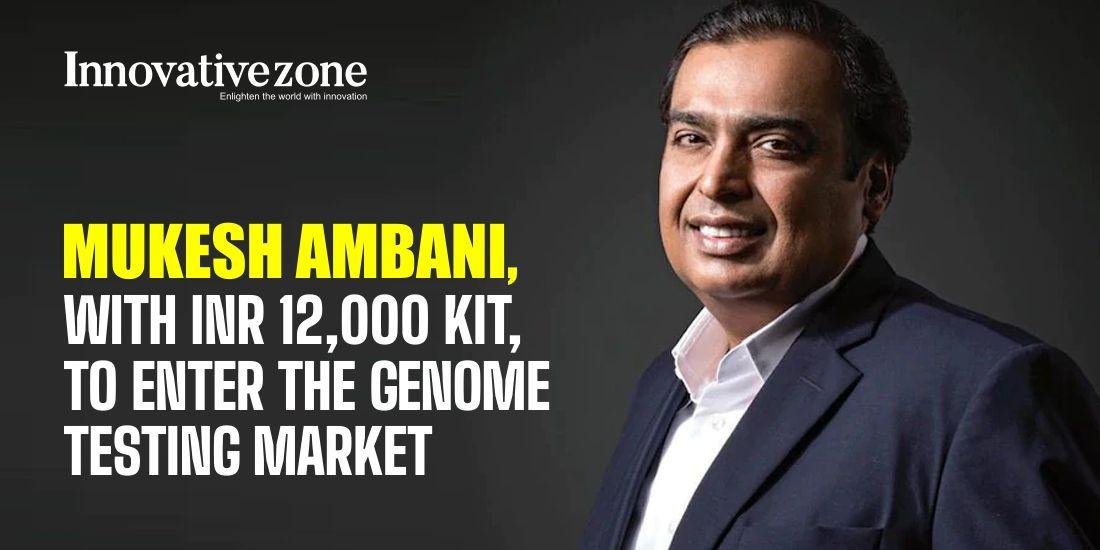Mukesh Ambani, with INR 12,000 kit, to enter the genome testing market
In an effort to broaden and reduce the cost of a healthcare trend being driven by forward-thinking American companies like 23andMe in India’s burgeoning consumer market, a company led by billionaire Mukesh Ambani is foraying into the field of genetic mapping.
According to Ramesh Hariharan, CEO of Strand Life Sciences Pvt., which created the product, the energy-to-e-commerce giant would launch a thorough 12,000 rupee ($145) genome sequencing test in the coming weeks. The Bengaluru-based company was acquired by Reliance Industries Ltd. in 2021, and the company—led by Asia’s richest person—now owns around 80% of it.
According to him, the genome test can reveal a person’s susceptibility to cancer, cardiac and neurodegenerative disorders, as well as reveal inherited genetic issues. Also, it costs about 86% less than alternative local solutions.
The plan to make personal gene mapping available to the 1.4 billion people in India, which is on course to overtake China as the world’s most populous nation, may result in a plethora of biological data that may aid in the region’s drug development and ailment prevention.
Additionally, it aligns with Ambani’s intentions to broaden his data-related projects, which he has frequently referred to as the “new oil,” as he moves his $192 billion company from the refining sector to consumer and digital services.
The genomic profile will be the least expensive in the world, according to Hariharan, who also co-founded Strand Life Sciences. We’re starting at a high price point to encourage adoption since it will offer us an opportunity to establish a successful business in preventative healthcare.
Signs of Illness
The cost of 23andMe’s health plus ancestry reports is $199, whereas ancestry reports can be purchased for $99 from the company. Competing Indian companies MapmyGenome and Medgenome charge over $1,000 for whole genome sequencing for health concerns. The most affordable products from certain Chinese businesses cost as little as 599 yuan ($87), but they might not map the whole range of ailments that Reliance-owned Strand hopes to identify.
Ambani is accustomed to causing price disruption; the company utilised a similar aggressive strategy when it entered the retail sector in 2006 and the telecommunications sector in 2016, destroying competitors and establishing Reliance as the market leader in both.
The global market for genetic testing was anticipated to be worth $12.7 billion in 2019 and is expected to reach $21.3 billion by 2027, according to a study from Allied Market Research.
When notified about Reliance’s new offering, Vishal Manchanda, senior vice president at Systematix Institutional Equities, stated that the new genome testing service “would ideally lead to creation of a vast pool of data which will allow development of focused treatment and early intervention”.
Cheap pricing might not, however, be enough to draw users in a market like India where awareness of such services and their benefits is still largely unproven. While being less expensive than its international rivals, Reliance’s $145 price tag is still excessive for the ordinary Indian consumer, as around two-thirds of the country’s population live on less than $2 per day.
Aggressive Advertising
Reliance’s genome testing product, which just requires blood samples that can be gathered at home, may be promoted through its digital services and its most recent e-commerce acquisitions.
Reliance will aggressively market it on its MyJio app in the upcoming weeks with an outreach of 425 million wireless subscribers of Reliance Jio Infocomm Ltd., health app JioHealthHub, and the recently acquired e-pharmacy, Netmeds, according to Hariharan. It is currently being tested out by a small group of early adopters.
While tracking ancestry or traits like athletic propensity, hair texture, and propensity towards obesity have garnered a lot of public interest in the US — tests dubbed “recreational genetics” – the longer-term economic model of these businesses is based on preventative health care.
Genetic Link
Global drugmakers may be able to create new treatments and learn how to more effectively target existing therapies with the help of increased genomic data. This might be especially helpful in India, a nation with a poor genetic map, for establishing a genetic connection to, say, some of the over-represented diseases there.
The US Food and Drug Administration restricted 23andMe from making any health-related claims in 2013 and subjected the firm to a two-year review process. Nonetheless, these objectives have yet to materialize anywhere, and early adopters like 23andMe are now under regulatory pressure. The governing body authorized 23AndMe to provide medical testing in 2015.
India has yet not established regulatory guidelines for genetic tests, despite Strand’s assurance that it will take the most recent scientific findings into account when interpreting the test results. Also, it will be the business’s first offering in a complex and rapidly evolving scientific sector.
The Reliance group’s new genetic testing, according to Hariharan, would “set the standards” for India. “We will provide ethical consumer genomics by adhering to the research.”
Must Read:-
- Top 10 Largest Oceans and Seas in the World
- Top 10 automobile companies in India 2023
- Top 10 Electrical Companies in India 2023
- Top 10 Real Estate Companies in India-2023
- Top 10 most awaited & upcoming Hindi web series 2023-24
- Top 10 Clothing Brands in India 2023
- Top 10 best cultures in the world-2023
- Top 10 best country to work and live in 2023
- Top 10 best country for education 2023
- Top 10 Most Followed Celebrities on Instagram 2023


